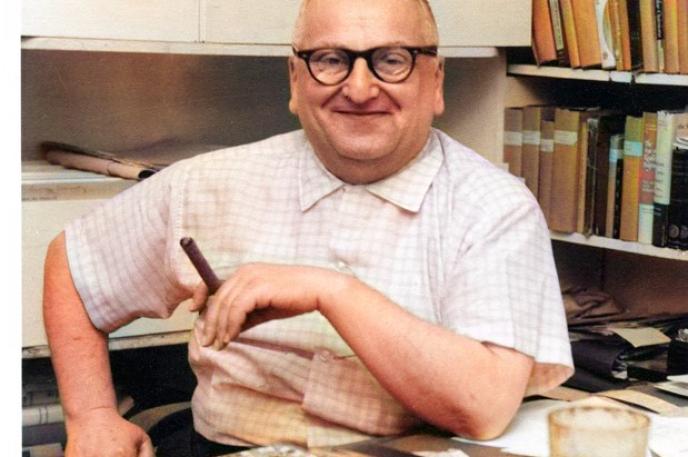
Behind the Vault Doors: The life of journalist Harry Golden
February 15, 2022
Harry Golden (1902-1981) was born Harry Goldhirsch on May 6, 1902 in eastern Galicia. In 1905, he immigrated to America with his parents Leib and Anna Klein Goldhirsch. The family settled in the Lower East Side of New York City and changed their last name to Goldhurst. Leib Goldhurst worked as a teacher and later served as the editor of the Jewish Daily Forward.
Harry was an excellent scholar and equally well-read in areas of literature, history and philosophy. During the day, Harry peddled newspapers and clerked for Oscar Geiger’s Fur Manufacturing Company. At night, he attended East Side Evening High School and graduated in 1921. For the next three years, he attended night classes at the City College of New York, but left before graduating. From 1918-1921 while working for Oscar Geiger, he became involved with the Round Table Literary Club. It was through this organization that Harry rounded off his education and became a public speaker for the Socialist Party and social reforms.
Harry Golden. Photographed by Verdie Perille, 1956. (Courtesy of RSCR, H_2000_01_349_20)
After leaving college, Harry worked as a stockbroker and by 1926 he was the head of the firm Kable and Company. That same year he married Genevieve Alice Marie Gallagher, a schoolteacher. The couple had four sons, Richard (b. 1927), Harry Jr., (b. 1927), William (b. 1929) and Peter (1938-1957).
In 1929, Harry’s brokerage firm filed bankruptcy and he was charged with mail fraud. Found guilty, Harry spent three and half years in the Atlanta Federal Penitentiary. He returned to New York in 1933 and worked for his brother, Jacob, who ran a hotel. However, Harry’s new aspiration was to become a journalist. Between 1939 and 1941, he sold advertisements for the New York Daily Mirror and the New York Post. It is reported that he worked at a number of southern newspapers at this time, but there is no verification of the exact locations.
By late 1941 after a stint in Norfolk, Virginia, Harry settled permanently in Charlotte. He changed his last name to Golden to protect his prison record, which was later revealed in the late 1950s. His first job was selling advertising and writing editorials for the Charlotte Labor Journal and the Charlotte Observer. It was in Charlotte that Harry Golden’s reputation as a defender of civil rights and social justice solidified.
Masthead of the Carolina Israelite, 1956. Courtesy of UNC-Charlotte's Race & Education in Charlotte Exhibit.
“...It wasn’t that it was easier to start a newspaper in Charlotte than it was in New York—it is hard to start a newspaper anywhere—it was that the big story was in the South...” -Harry Golden
In October 1942, he worked with the Charlotte News to print his own newspaper, the Carolina Israelite. Two years later Harry assumed all publishing and printing duties, which enabled him to publish the Carolina Israelite on a regular basis. The paper was solely Golden’s creation--he sold advertisements, wrote articles, and built an international circulation of 30,000. In 1958, a fire destroyed his subscription lists. This event was soon followed by the publication of his criminal record. However, Harry and the Carolina Israelite persevered until it folded in 1968.
Left to right: Harry Golden, Richard E. Thigpen, Judge John J. Parker, and Judge Francis Biddle. Harry Golden awarded the Carolina Israelite Gold Medal Award to Judge John J. Parker at Hotel Charlotte, February 1949. Courtesy of Charlotte Observer.
Harry Golden became the spokesperson for the rights of the oppressed, whether by race, religion, or economic status. His articles, although satirical in nature, raised subjects that were often taboo in the south, including equal rights for the Black community and discrimination against Jewish people. Harry wrote for the Nation, Commentary Life, and Congress Weekly, and in 1961, he covered the infamous Eichmann Trial.
In 1958, Golden became a best-selling author with the publication of his essays entitled Only in America. One year later the book was adapted by famed playwrights Jerome Lawrence and Robert E. Lee and presented on Broadway. Other works by Golden include Jews in American History: Their Contributions of the United States of America with Martin Rywell (1950), Jewish Roots in the Carolinas: A Pattern of America Phil-Semitism (1955), For 2 cents Plain (1959), Enjoy, Enjoy! (1960) Carl Sandburg (1961), Five Boyhoods (edited by Martin Levin, 1962), You’re Entitle’ (1962), The Harry Golden Omnibus (1962), Mr. Kennedy and the Negroes (1964), So What Else is New? (1964), Ess, Ess, Mein Kindt (1966), The Best of Harry Golden (1967), The Right Time; an Autobiography; an Autobiography (1969), So Long As You’re Healthy (1970), The Israelis; Portrait of a People (1971), The Golden Book of Jewish Humor (1972), The Greatest Jewish City in the World (1972), Travels through Jewish America (with Richard Goldhurst, 1973), Our Southern Landsmen (1974) and Long Live Columbus (1975). At the time of his death, Golden left an unpublished manuscript, “America, I Love You.”
Harry Golden in his Charlotte home (Courtesy of RSCR, MIC_2013_08_274_00)
In addition to his career in journalism, he was also a member of the American Jewish Congress, NAACP, Southern Regional Council, the Catholic Interracial Council, and B’nai B’rith.
On October 2, 1981, Harry Golden died in his beloved, adopted city of Charlotte, and is buried at the Hebrew Cemetery.
--
The Robinson-Spangler Carolina Room houses the Harry Golden Papers, 1960-1978. To learn more about collection materials, view the finding aid on ArchivesSpace.
Written by Shelia Bumgarner, Robinson-Spangler Carolina Room librarian.
